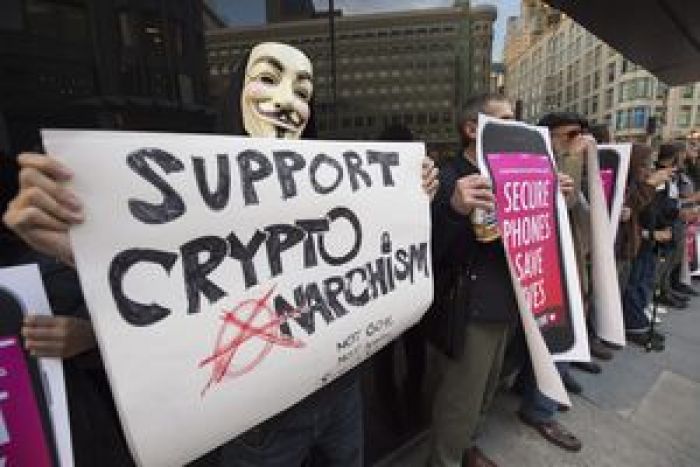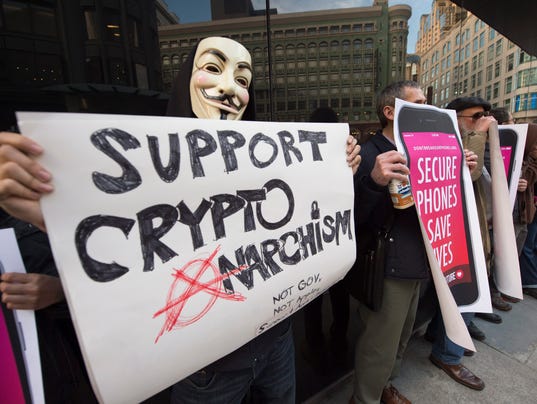Wolff: The real reason behind the FBI/Apple iPhone uproar










Michael Wolff, USA TODAY 8:58 a.m. EDT April 4, 2016

People rally in front of an Apple Store in San Francisco, Feb. 23, 2016.(Photo: John G. Mabanglo, EUROPEAN PRESSPHOTO AGENCY)
In Apple vs. the United States Government in the matter of iPhone encryption, who won — or, for that matter, what exactly happened? Two immovable objects on a clear collision course … and then … easy-breezy?
Both sides made no-room-for-compromise cases. For Apple, the sacrosanct inviolability of its encryption defined the nature and value of its product; were that encryption to be compromised on the phone in question — that used by Syed Rizwan Farook, one of the dead San Bernardino terrorists — all phones might become vulnerable. If iPhones are vulnerable, consumers are vulnerable. For the government, its ability to fight terrorism and to maximally protect the American people, and to continue to use the policing tools that it has gained over communication in the modern era, it needs access to the iPhone data — and, by implication, it had to establish dominance over any individual technology company.
But last week, as the confrontation headed for a make-or-break legal ruling, the government produced a trump card, announcing that a third party company (speculation was that it was an Israeli outfit) had successfully opened the phone.
The government — which in many respects, had been seen on the losing side of this argument, opposing the world’s most valuable company, aligned against the tech industry and its left/liberal privacy acolytes, pursuing yet another security overreach, heading into uncertain legal territory, and, to boot, looking technically ham-handed — had suddenly pulled the rug out from under Apple.
The iPhone, rather than being a product of the highest standards immune to attack, was, it turned out, putty in someone’s hands. Hence, everything that Apple had said — in quite apocalyptic terms — about the terrible things that might happen were the phone to be hacked, might now reasonably come to pass. What’s more, it seemed quite unlikely that its adversary, the government, would now identify the phone’s vulnerability so that Apple could fix it. No, the iPhone's Maginot line had been crossed.
This rather prompted the question of why Apple had been so confident of its encryption powers. Was it merely naïve in its belief in its own technical competence? Blusteringly overconfident? Just arrogantly dismissive of the government’s prowess? But if all encryption systems are ultimately vulnerable — and they are, aren’t they, otherwise we wouldn’t need ever-more-secure encryption — why stake your reputation on an absolute need to be unbreakable?
The government accused Apple of PR grandstanding, and perhaps that was an element here. It’s Edward Snowden’s world of virtue and we just live in it — Apple was fighting the good fight. If a court ordered it to open the phone, the martyred company would merely announce an immediate redesign and become a hero again. A PR win-win.
At the same time, PR-wise for the government, it certainly seemed convenient that it managed to hack the phone in the days after the Brussels bombing. It might not be able to pull a rabbit out of the hat to stop terrorism, but it could pull one out to unencrypt devices that terrorists, among the rest of us, rely on.
If that’s what happened. It’s quite likely that we will never actually know if there was a timely hack, by third parties, Israeli or otherwise (part of the general myth of intelligence is that, when in doubt, evoke the Israelis) and if Farook’s phone now lies open. The government, by simply declaring the hack. has solved many of its problems.
It undermined the authority and invincibility of Apple, and, by extension, all other technology companies. In the future, they might be more inclined to cooperate than to be shown up for fools. It reassured the public that the government is not the helpless party. It avoided the possibility of a legal ruling against it. And, as cream on top, it sent a message to terrorists that there is nowhere to hide. If the Farook data had initially seemed to be the point, that, in the contretemps, surely took a back seat to the perceptual issues. The government could not let Apple win. Therefore, it announced victory for itself.
At the same time, it is not just the myth of encryption that Apple is defending, it is the virtue of encryption. In this, peculiarly, technology companies, whose business model largely involves knowing everything there is to know about us, become the protectors of our privacy. Indeed, Edward Snowden, from his Moscow redoubt, has been on a recent Twitter toot in defense of Apple and its selfless stand. What terrorism is for the government, the bugbear from which it derives its moral standing, the government is for Apple, the goblin from which it earns its cred by resisting.
Just to recount: The government went to the mattresses to open a phone looking to track a dead terrorist's contacts, most of which would have been available through other tracking sources (hello, NSA?). Apple, which regularly has assisted the government in the past, decided this time not to, and to stare down the Justice Department. The government, after all that, just happened to be able to solve the problem without Apple’s cooperation. Apple, surely knowing the vulnerability of its encryption, forced the government to exploit it — making it the culprit.
So, if the real point was neither the hunt for terrorists nor the sanctity of encryption, what was this about? Brand? Prerogative? Principle? Or just tentative lines in the sand, a rehearsal for a future in which all of these issues — the domination or submission of tech companies, the fight for the hearts and minds of a tech-reliant public, what can and should be recorded and who should know it — will be fought over again and again?
Read or Share this story: http://usat.ly/1RTiYmu









